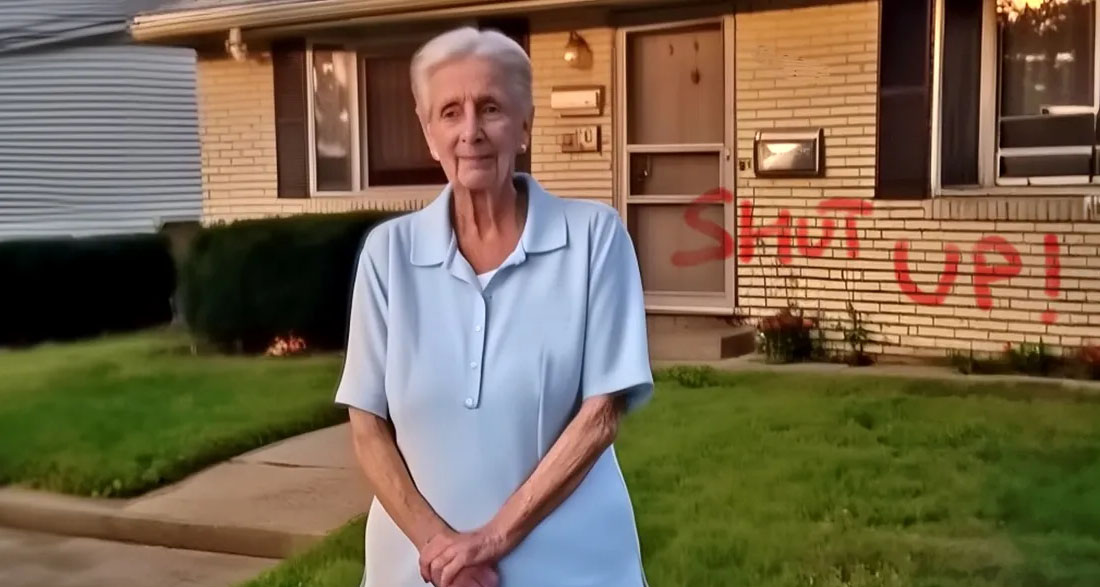The Piano, the Grinches, and the Comeback of a Lifetime
Every time I played the piano, it was like I was talking to my late husband, Jerry. That music was our special connection, even now that he was gone. But then, one awful day, some mean neighbors destroyed that joy with a cruel message. What they didn’t know was that my granddaughter wasn’t going to let them get away with it. And by the end of it all, those rude neighbors were left completely stunned.
“Oh, Jerry, did you enjoy that one, darling?” I asked softly as the last note of “Clair de Lune” faded in the warm air of my living room. My fingers rested gently on the piano keys, and I looked at the picture of Jerry on the side table. He smiled at me from that frame with the same loving eyes I’d stared into for over 50 years.
At my feet, Willie—my chubby tabby cat—stretched out and purred like a tiny engine. I reached down to scratch behind his ears, then picked up Jerry’s photo with both hands.
“I miss you every day,” I whispered. “It’s been five years, but sometimes it still feels like you just stepped out to get milk.”
I kissed the glass of the frame and smiled. “Dinner time, my love. And don’t worry—I’ll play your favorite before bed, just like always. ‘Moon River’ for you.”
I could almost hear his voice teasing, “You spoil me, Bessie.”
I chuckled softly and shuffled into the kitchen, glancing back at the piano. That beautiful instrument had been with me for 72 years—it knew all my secrets, my tears, my laughter.
“What would I ever do without you?” I said, running my hand across its smooth surface.
That night in bed, I whispered into the dark, “Goodnight, Jerry. See you in my dreams.”
The next morning, I was deep into Chopin’s “Nocturne in E-flat major” when—BANG!—a sharp knock on the window made me jump. I fumbled the notes and turned to see a red-faced man glaring at me from outside.
“Hey, lady!” he yelled. “Stop that noise! You’re keeping everyone up with your stupid piano playing!”
I froze. “I… I’m sorry,” I stammered. But it was 11 a.m. and I never played loud. None of the neighbors had ever complained before.
He stomped away without another word, and I felt my heart sink. I slowly closed the piano lid—my sanctuary now felt like a crime scene.
The next day, I made sure every window was closed before I sat down to play. The music sounded quiet and dull, like it had been shoved under a blanket. I only wanted to keep the peace.
But barely ten minutes into Beethoven’s “Moonlight Sonata,” my doorbell rang like it was being attacked.
When I opened the door, a woman with a sour face glared at me.
“Listen up, old lady,” she snapped. “The grave’s calling and you’re still banging on that piano? Cut it out or I’ll report you to the HOA!”
Only then did I realize—this was that man’s wife.
“I… I already closed the windows,” I said weakly.
“Well, it’s not enough!” she barked. “Stop with the stupid piano already!”
She spun around and stormed off. I leaned on the doorframe, tears building in my eyes.
“Oh, Jerry,” I whispered, “what should I do?”
I could almost hear him answer, calm and steady: “You play, Bessie. You play your heart out. Don’t stop… not for anyone.”
But when I sat back down, my fingers wouldn’t move. The joy was gone.
Days passed. I tried everything—taping cardboard to the windows, only playing in short spurts, even thinking about moving the piano to the basement.
But those neighbors, who I now called “the Grinches” in my head, weren’t satisfied.
I hated the thought of moving my piano. It wasn’t just furniture—it was part of me. It was where Jerry lived, where our memories danced in every chord.
One night, I let the music carry me away and forgot all about the neighbors.
The next morning, I stepped outside to water my herb garden—and stopped in horror.
Spray-painted across my wall in bright red letters were the words: “SHUT UP!”
I dropped to my knees and cried like I hadn’t in years.
“I can’t do this anymore, Jerry.”
That day, for the first time in decades, I didn’t touch the piano.
That night, I sat in Jerry’s old armchair, holding his photo.
“I’m so sorry, my love. I don’t have the strength to fight anymore.”
Then the phone rang.
“Hello?”
“Mom? It’s me,” came Jacob’s warm voice—my son.
“I’m fine,” I lied. “Just a quiet day.”
“You don’t sound fine,” he said gently. “Is everything okay?”
And that was it. The floodgates opened. I told him everything—the yelling, the threats, the ugly message on my wall.
“I feel so lost,” I whispered.
“Oh, Mom,” he said, his voice tight with emotion. “Why didn’t you tell me sooner? You’re never a burden. You’re a blessing. Remember the Christmas parties you played at? The school recitals? Your music makes people smile.”
He paused, then added, “I’m calling Melissa. She’s nearby. She’ll come check on you, and we’ll figure this out.”
For the first time in weeks, I felt a flicker of hope.
Days dragged by. My piano sat silent, collecting dust. It felt like my soul was drying up.
Then—BANG BANG BANG!—a knock on the door jolted me out of my thoughts.
I opened it, and there stood Melissa, my granddaughter, her eyes bright and her arms open.
“Surprise, Nana!” she cried, hugging me tightly.
But as soon as she saw the graffiti, her face fell. “Nana… who did this?”
I told her everything, my voice breaking with every word.
“Oh, Nana,” she whispered, furious and heartbroken. “Did you call the police? The HOA?”
“I didn’t want trouble. That piano… it’s all I have left of Grandpa.”
Melissa took my hands. Her eyes were full of fire.
“They don’t get to treat you like this. These entitled jerks have no idea who they’re messing with. You’re my Nana. And we’re going to fix this!”
“How?” I asked.
Her smile turned mischievous. “We’re about to teach the Grinches a lesson.”
The next day, Melissa was unstoppable. She made phone calls, ordered packages, and even got a few friendly neighbors involved.
That night, she hid tiny speakers in the bushes around the Grinches’ house.
“Nana,” she said, winking, “showtime.”
When the Grinches pulled into the driveway, the speakers started playing soft, mysterious piano music. They came outside, looking confused.
Then the music turned into barking dogs and honking car horns.
They panicked, racing around trying to find the source.
I giggled like a schoolgirl.
Then Melissa hit another button.
PHHHHHHHHHBBT!
The yard exploded with ridiculous fart sounds. I doubled over, laughing until tears ran down my cheeks.
“Melissa!” I cried. “You’re terrible!”
She hugged me. “Nobody messes with my Nana.”
The next morning, a construction crew pulled up in front of my house.
“What’s going on?” I asked.
Melissa beamed. “We’re soundproofing your piano room. Top to bottom.”
“You mean I can play whenever I want?”
“That’s right,” she said, squeezing my hand. “No one will ever silence you again.”
When the work was done, I sat at my beloved piano. My fingers trembled, then pressed down. Music soared through the room—bright, clear, perfect.
“Moon River” never sounded so sweet.
Melissa danced around with a glass of wine. “You rock, Nana! Grandpa’s dancing with us, I just know it!”
When the song ended, I looked at her, heart full. “Thank you, sweetheart. You gave me back my voice.”
“No, Nana,” she said, kneeling beside me. “You always had it. I just helped you remember.”
Before she left, she handed me the silly fart-sound remote.
“Just in case the Grinches try anything. But I think they’ve learned their lesson.”
I hugged her. “I love you, Melissa.”
“Promise me you’ll keep playing.”
“I promise.”
After she left, my phone buzzed.
A text from Jacob:
“Melissa told me everything. I’m so proud of you, Mom. Love you. ❤️”
I smiled through happy tears.
“I’m doing better than I have in weeks. Love you too. 🤗🎼”
And as I walked back inside, I could almost see Jerry standing by the piano, arms open, waiting.
“This one’s for you, my love,” I whispered as I began to play again. “And for our family, who never gave up on me.”
The notes of “Moon River” floated through the air, warm and golden.
And I knew, without a doubt—Jerry was listening.














